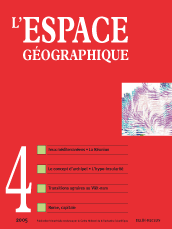

Mediterranean forest fires: Nature wrongly accused (1 tabl., 1 fig., 1 photo)
The risk of fire in a semi-urbanised Mediterranean forest: the fire at Cagnes-sur-Mer (31 August 2003) (1 tabl., 7 fig., 5 photos)
Anger over forest fires in the Mediterranean region has been directed at nature. In substance, extreme weather and flammable vegetation have been blamed for the regular recurrence of fire. This paper aims to challenge that model of explanation, in particular by examining human responsibility and the mistakes of prevention policy, and by setting the issue of forest fires in a longterm historical perspective.
keywords: FIRES, FOREST, MEDITERRANEAN, PREVENTION, RISK
From toponym to concept: uses and meanings of the term “archipelago” in geography and the social sciences
The term “archipelago”, whose analogical use has spread in geography and the social sciences, has been chosen for an attempt at conceptual epistemology. Every word or concept has a story behind it, and that story contains the key to its meaning. Using the example of archipelago, this paper makes some theoretical proposals about reticular territoriality, based on the recurrence of the archipelago analogy in analyses of contemporary spatial changes and the challenge that those changes pose to geographical concepts. It is also an opportunity to give a more stable content to a rich concept, whose uses are sometimes inconsistent or contradictory, and which is often associated, assimilated or confused with the image or model of the island. Lastly, the genealogy attempted here aims to offer an example that highlights the issues associated with a cross-disciplinary conceptual exercise.
keywords: ARCHIPELAGO, CONCEPTUALISATION, METROPOLISATION, NETWORK, SOCIAL SCIENCES, TERRITORIALITY
“Hypo-insularity”, a new insular condition: the example of the French West Indies. (2 tabl., 2 fig., 1 photo)
Since the late 1980's, circulation has had a major impact on the French West Indies. The expanse of sea separating Guadeloupe and Martinique from other spaces is now traversed by multiple flows that combine and criss-cross. Through various channels, a continuous flow of sounds, images, ideas, people and products enters the two départements and introduces exogenous elements to local elements on a local basis. This unprecedented configuration, which makes the traditional restrictions of insularity, defined in terms of isolation and distance, appear more relative, contributes strongly to the emergence of a new insular condition, which we have called “hypoinsularity”.
keywords: CIRCULATION, DISTANCE, INSULARITY, TELECOMMUNICATIONS, TRANSPORT
Reunion Island: from an island of disunion to the Reunion of the Highlands and Lowlands (2 fig.)
The name of Reunion Island is highly symbolic. The island's geographical space is in effect divided into two qualitatively separate areas by morphogenetic gradients. For historical reasons, a highland/lowland divide characterises the tropical island, with direct consequences on how those component areas are perceived. It now seems particularly relevant to examine that opposition which has remained constant in space and time at a time when the highlands are about to become a national park, and in the broader context of globalisation, European integration and sustainable development.
keywords: INSULARITY, IDENTITY, TOURISM, REUNION ISLAND HEIGHTS
Developing a multi-scale method for analysing agrarian transition. Application to trends in rural mountain areas of North Vietnam (5 fig., 1 photo)
The mountainous rural communities of northern Vietnam have benefited the least from the rapid development resulting from the doi moi economic reforms of the 1980's. The technical, economic and social changes that accompanied that transition, combined with the extreme biophysical heterogeneity of northern mountains, has led to extremely complex agrarian trends that challenge traditional diagnostic approaches. An interdisciplinary team of researchers has been working in Bac Kan province since 1998, studying changes in land use in order to better understand the needs and opportunities of farmers. Several diagnostic tools were combined (i.e. monographic studies, multi-agent models, role-play, and geographic information systems) to analyse and represent interactions between farmers' strategies, the institutions that control access to and use of resources, and the biophysical and socio-economic environment.
keywords: AGRARIAN TRANSITION, MOUNTAIN AGRICULTURE, MODELLING, INTERDISCIPLINARY, PARTICIPATORY SIMULATION, SCALE TRANSFER, VIETNAM
The debate on Rome as capital. Geohistory of the choice of a place (6 fig., 3 encadrés)
This new, geohistorical reading of the debate on Rome as capital (1860-1871) argues for the introduction of a spatial viewpoint to the study of capitals. It presents the combination of political and geographical issues that govern the choice of a capital, on the basis of an original case the unification of Italy, which had three successive capitals: Turin, Florence and Rome. Using parliamentary bills, the paper then analyses the arguments for and against Rome as the capital, which reveal the spatial perceptions of the contemporary upper class. It shows that the choice of Rome, supported by history, was in fact the choice of a “neutral” town, an incomplete metropolis, in a polycentric Italy seeking unity.
keywords: CAPITAL, CENTRALITY, ITALY, ROME
![]() Tables and indexes for 2005 (116 Ko)
Tables and indexes for 2005 (116 Ko)
L’espace géographique 3/05![]()
![]() L’espace géographique 1/06
L’espace géographique 1/06
For subscribe or buy this issue: BELIN
![]() L’Espace géographique: contents
L’Espace géographique: contents
Last modified: November 22, 2005